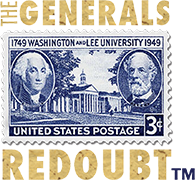The Unsettled State of Lee Chapel
Show me the manner in which a nation or a community cares for its dead and I will measure with mathematical exactness the tender sympathies of its people, their respect for the laws of the land and their loyalty to high ideals.
William E. Gladstone
British Statesman
The respect with which a civilization honors its dead has long been a gauge of its adherence to the duties of humane behavior and the cultivation of virtue in its citizens. That respect has found expression in the veneration of deceased persons of exemplary character and achievement, and in the enduring gratitude tendered to those of past generations whose labors laid the foundation of a society’s prosperity and moral strength. From the pyramids of Egypt, to the tombs of Ancient Greece and Rome, to the monuments to the dead of more recent times, we find inspiring evidence of the homage paid by great civilizations to their dead — homage extending from the towering monuments that honor national heroes to the simplest graves of common peasants.
And it bears remembering that none of these honored dead have been without spot. Each suffered some flaw of character or lapse of right conduct, however great or small. Nevertheless, in developed societies it has been the tradition that funeral panegyric on the dead praise and celebrate the goodness of a life rather than defaming it, so that flaws and missteps in the person eulogized have been commonly abridged or passed over without mention. The same tradition comprehends the epitaphs engraved on tombs of the dead, be they in Westminster Abbey or in humble country churchyards. A survey of funerary epitaphs reveals a uniformity of praise for whatever was worthy in the entombed, with intent to ensure that the record of their good works and virtues of character might live on to become an inspiration and support to those who follow. The arc of an enduring civilization rises upon the best in its historical heritage of individual and collective merit — wherever in its history, and in whatever circumstances, that merit is found.
On Washington and Lee’s campus today, however, little commitment to such salutary sentiments and long held funerary and burial traditions is in evidence. What we see instead is an untenable, unsettled ambivalence. Although Robert E. Lee is, for now, still paid the honor of remaining a namesake of the university, he has, on the other hand, been brazenly dishonored by having his name stripped from the Chapel. And this, despite the fact that Lee built the Chapel during his presidency of Washington College; and the further fact, obvious to anyone of normal sensibilities, that the aura of Lee’s presence will continue to dominate any thoughtful consideration of the building for as long as his bodily remains and those of his family are interred in it. The current state of the Chapel — half of it cleansed of all things reminiscent of Lee, the other half containing his tomb and the magnificent Valentine recumbent statue –juxtaposes forces of influence that are profoundly incompatible. If the usual fate of such tenuous compounding of opposites eventuates, the remains of Lee and his family will ultimately be disinterred from the Chapel, reducing the building to a sanctuary of triumphant Wokedom, where Washington and Lee’s woke students and faculty can at last feel “comfortable”; or, alternatively, the whole of the Chapel will be returned to its unmolested, pre-Woke condition, Lee and Washington memorabilia returned to it, and Lee’s tomb left undisturbed.
In the event of a Chapel triumph by the Woke faction there almost certainly would follow a successful removal of Lee’s name from that of the university, and Lee’s memory thus forever banished, essentially in toto, from the school. Banished as well, any lingering obligation to the hallowed communal tradition of honoring the dead; banished, any obligation to keep alive the undeniable and inspiring virtues of historical figures like Lee; banished, that sympathy for failings that all of us need; and banished, the greatest gift of all, a willingness to forgive, without which human society must ultimately collapse into intractable hatred, violence, and chaos. This is “cancellation,” Woke-style.
It sickens the heart to contemplate such a fate for Robert E. Lee. Also lying in Lee Chapel are the remains of Gen. Henry “Lighthorse Harry” Lee, Robert E. Lee’s father, who said in his funeral oration on George Washington what, in later years, he might equally have said of his son, that “Vice shuddered at his presence, and Virtue always felt his fostering hand.” Does Washington and Lee, in its reckless pursuit of Wokeness no longer intend to produce graduates before whom vice will “shudder” or who will foster “virtue”?
The reign of Wokeism at Washington and Lee must be ended. And of Robert E. Lee, as of all great and worthy men, the words attributed to M. Fontanes must again obtain:
“Opinion, subject to the caprice of the world and to time; opinions weak and changeable, the inheritance of humanity, vanish in the tomb; but glory and virtue live forever.”
Respectfully,
Kenneth G. Everett ’64
Imagine an independent institution in Lexington dedicated to educating students, faculty, and friends about the extraordinary legacies of Robert E. Lee and George Washington. Your generous support can help make this dream a reality. A powerful and permanent presence near campus—perhaps with a significant online platform—would not only protect freedom of speech and provide diversity of viewpoints, but it would strengthen our efforts to preserve Lee Chapel and other vital historic elements of Lexington. We are making tremendous progress toward this goal, but much work remains. Please help us achieve our goal of raising $155,000 by June 30, 2023. Thank you in advance for your support. See the link below for donor information.
